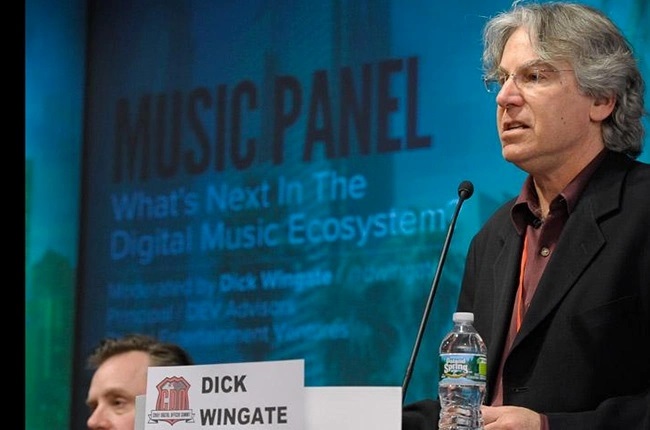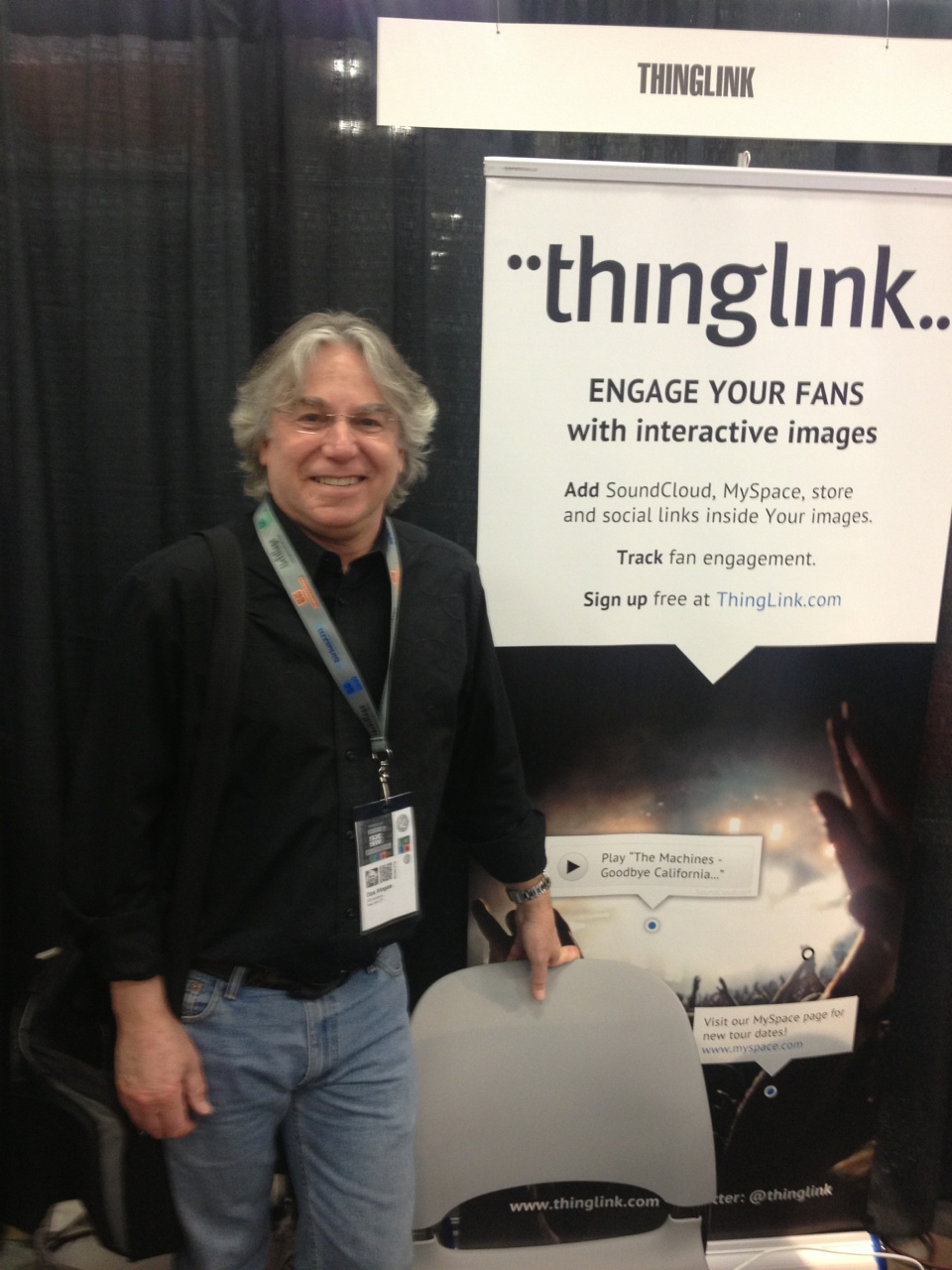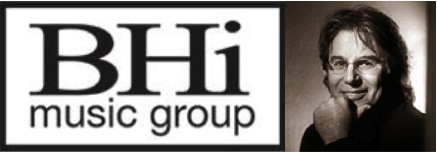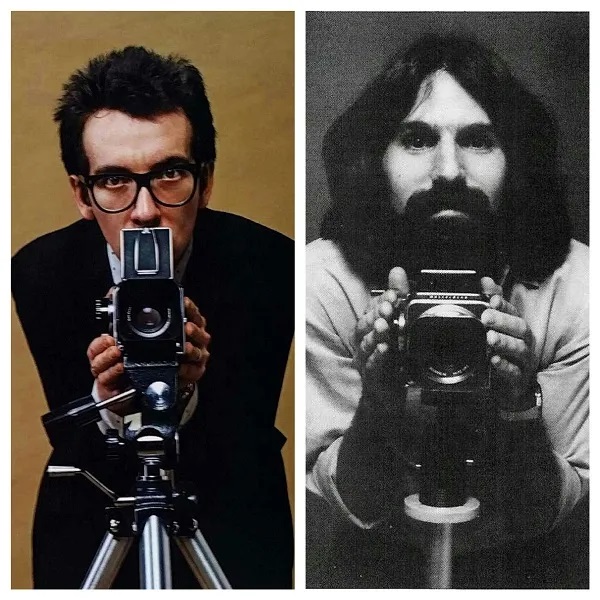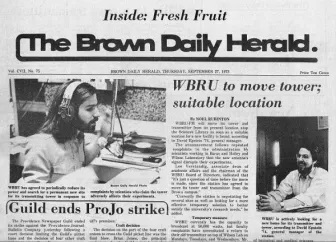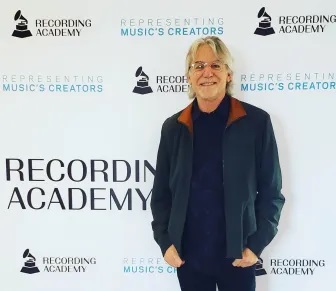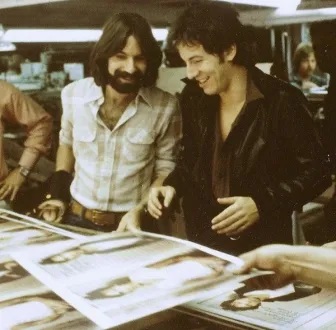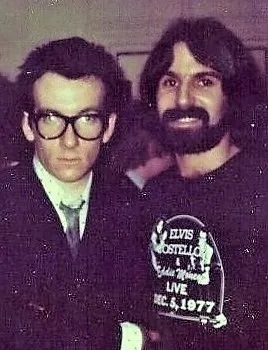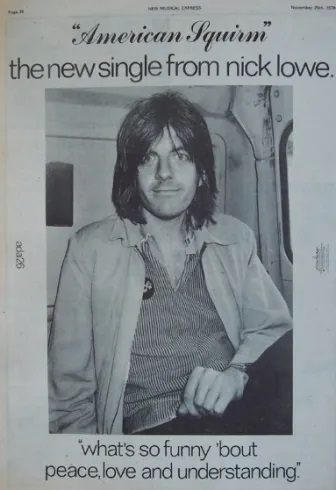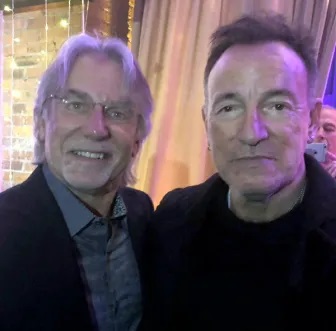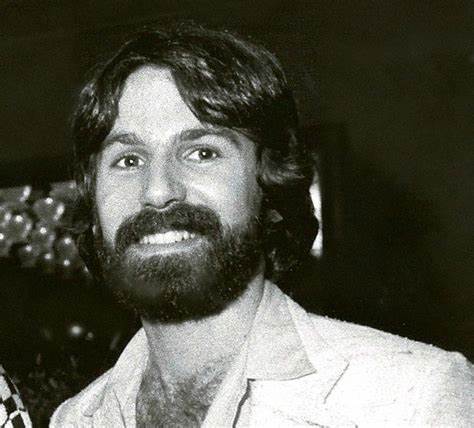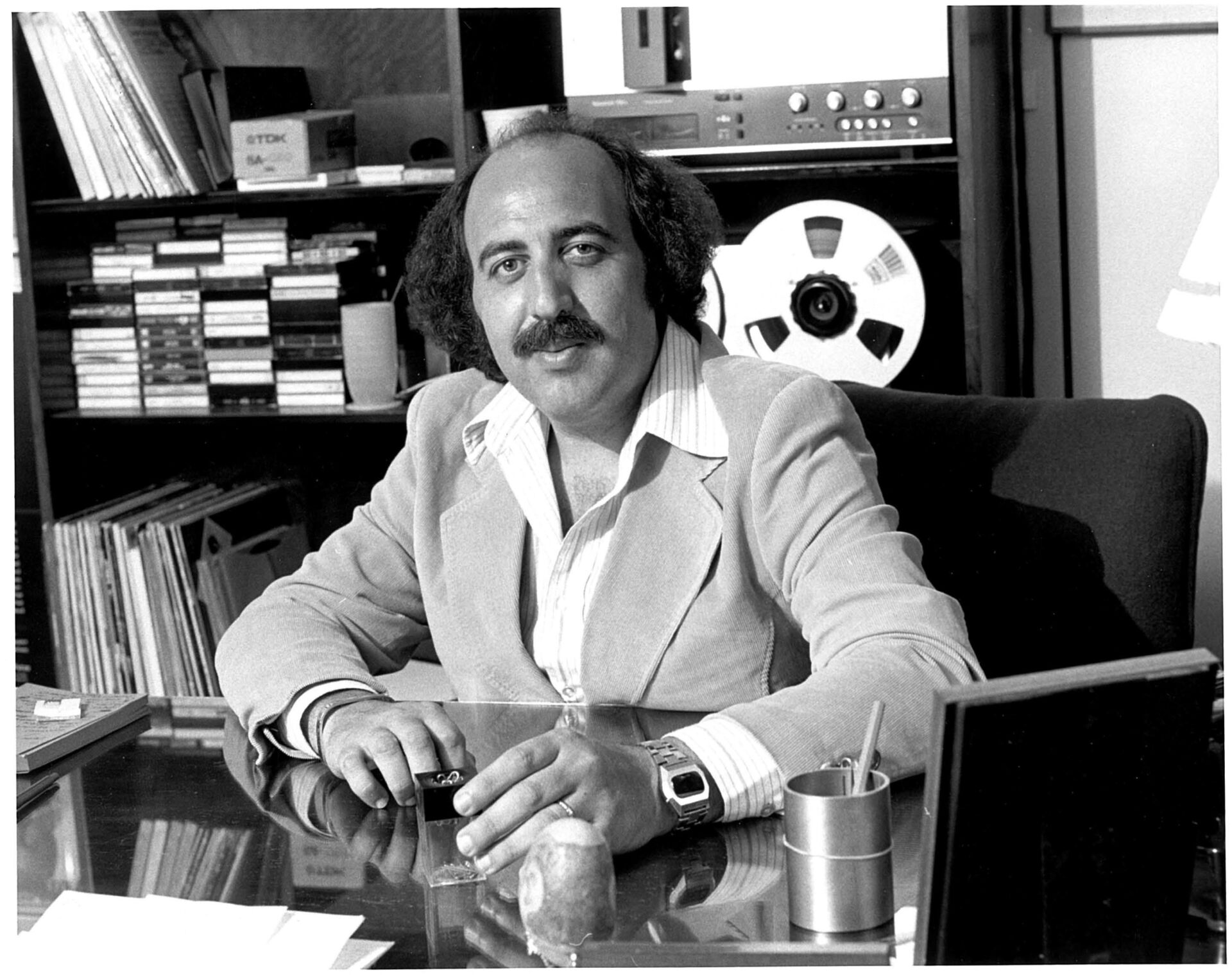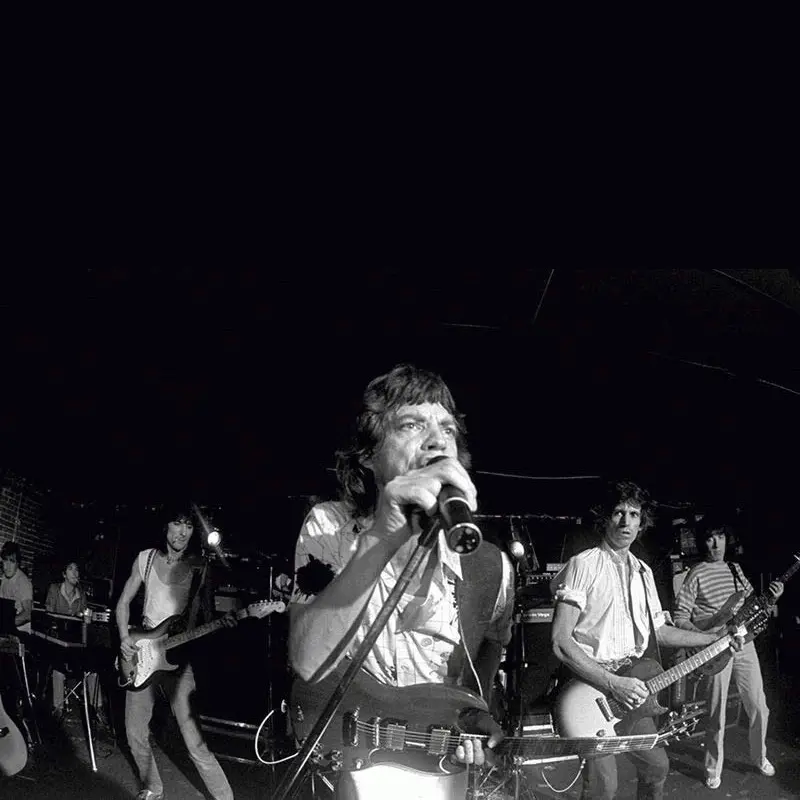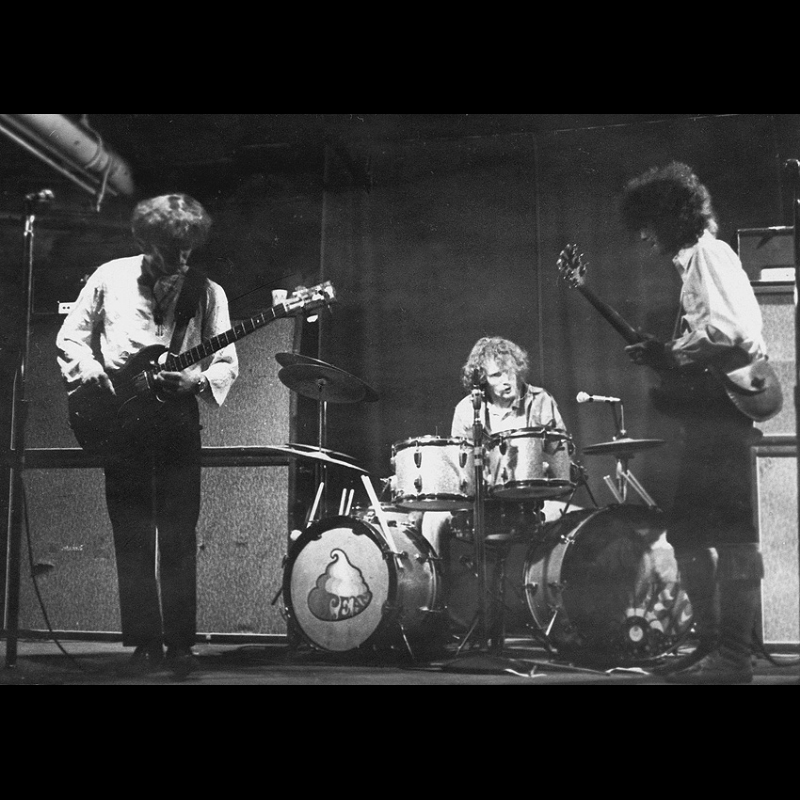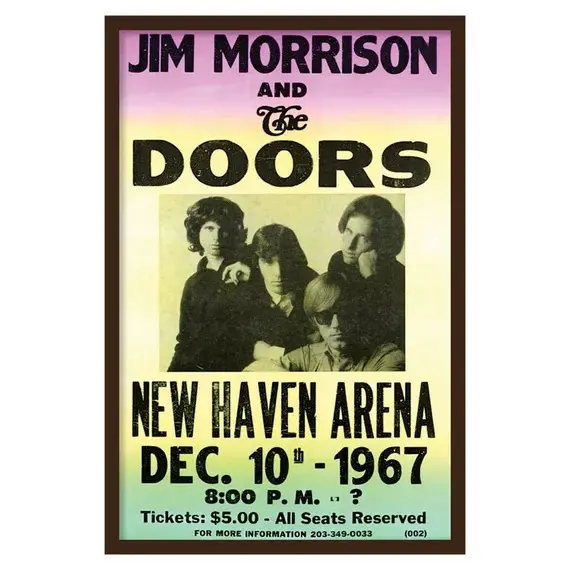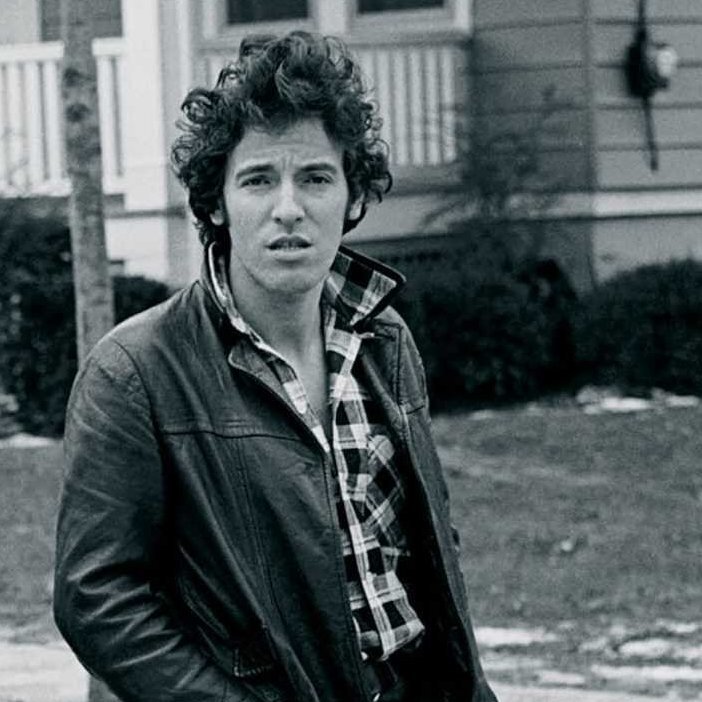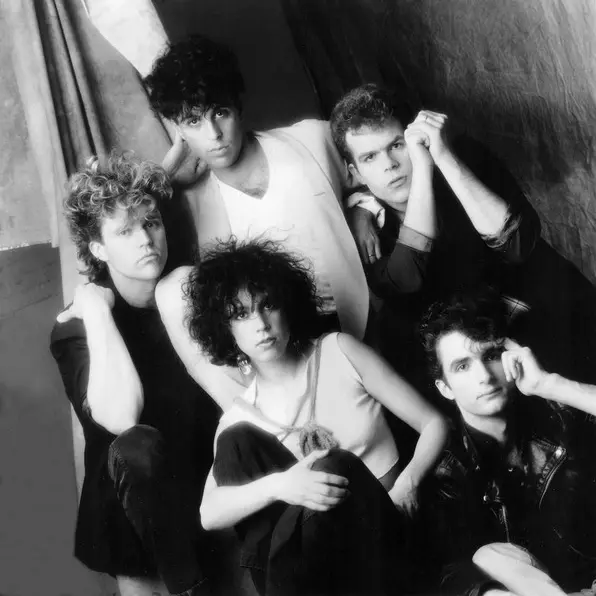Dick Wingate

In a music-biz career spanning five-plus decades, he’s been a deejay, a product manager, an A&R exec, a marketing VP and a media consultant, each position paving the path to what he’s been for the last 30-odd years: a maverick of music’s ongoing digital revolution. And when he looks back on it, he wonders, “How did I get so lucky?”
That’s what Dick Wingate said in a 2020 interview with NJArts, the humility of the statement prefaced with a credit-deflecting summation of his time working in radio and for record labels. “I had the most extraordinary musicians that I had the sheer joy of working with,” he said. “It was so incredible that I sometimes had to pinch myself. “
Wingate has spent the past three decades building a bridge between the archaic analog of the recording industry’s 20th-century tech and distribution methods and the download-driven digitization of the 21st’s, uniting the two in partnerships that deliver music more broadly, quickly and cheaply than ever before. And his vast range of experience and contacts in the old tape-and-vinyl world has established him as the consummate dealmaker in the new broadband-based one.
DJ, Music Director, Program Director
Born on April 6, 1952, in New Haven Connecticut, Wingate spent his high school years going to as many rock concerts as he could including Cream, The Beach Boys, The Jeff Beck Group, The Rolling Stones and The Doors.
From 1970 to 1974, he worked at WBRU, Brown University’s 20,000-watt FM station – Rhode Island’s most popular rock station at the time – as a deejay, music director and, in his senior year, program director. Record labels invited him to all press events and concerts in Providence and Boston while often sending their artists to the station for on-air interviews, including 23-year old Bruce Springsteen who so shy that Wingate decided not to broadcast their chat.
“It was around the release of the first album [Greetings from Asbury Park, issued in January 1973],” Wingate said in 2020. “It was either the first or second radio station he had ever been to. He was painfully shy, so we just talked and didn’t go on the air. Later that night, he played a gig [on the Brown campus] with the original lineup of the E Street Band and I was hooked for life.”
Janus Records, WPLR
Upon graduation in 1974, Wingate joined Janus Records, the New York City-based label of British prog-rock bands like Camel and Caravan, whose songs he’d played in regular rotation at WBRU. On weekends, he deejayed at WPLR in New Haven and became the first disc spinner in Connecticut to air tracks from Springsteen’s breakthrough album, 1975’s Born to Run.
His first assignment at Janus was to provide marketing support for Al Stewart’s 1973 album Past, Present and Future, which introduced the Scottish folk-rocker to the American market and paved the way for two top-10 singles, “Year of the Cat” (#8, 1976) and “Time Passages” (#7, 1978).
Columbia Records
But Wingate had his sights set on working for a bigger, more influential label – Columbia, specifically – and continued developing the relationships he’d forged with Columbia’s promo team while working at WBRU, hobnobbing with them at Springsteen’s and other artists’ gigs at Brown, in Boston and in New York through 1974 and ’75. In January 1976, the 23-year old’s professional dreams came true when Columbia hired him as its youngest-ever product manager.
In the behind-the-scenes promotional role, he was responsible for managing marketing plans for albums and tours, including all associated merchandising and packaging through video, television, radio, print, billboards and other media. “To the artist, we were supposed to be the guy that if they could only make one call to the record company, it would be to the product manager,” he said in 2020. “[Product managers] should be knowledgeable about everything that’s going on in sales and promotions.”
Born to Run, Elvis Costello
Wingate’s first project for Columbia was to support Born to Run, issued less than five months before he’d joined the label. His primary contact was Jon Landau, Springsteen’s newly hired manager, who in 1974 hailed the singer-songwriter as “rock ‘n’ roll future” in a now-legendary concert review for the Boston-based alternative weekly The New Paper.
In October 1977, he was assigned with promoting a new Columbia arrival, Elvis Costello, after the 23-year-old singer-songwriter signed with the label following Stiff Records’ release of his debut album, My Aim Is True, in the UK in July that year; Columbia acquired the rights to the LP and reissued it in November. His first Costello-related assignments were marketing the debut album and his sophomore effort, 1978’s This Year’s Model, followed by Costello’s third, 1979’s Armed Forces. “It would take Bruce two or three years [to make an] album,” Wingate said in 2020. “It would take Elvis two or three months.”
Darkness on the Edge of Town, Other Columbia Projects
In 1978, Wingate was handed a second Springsteen LP to promote, Darkness on the Edge of Town, released in June. In March, when he listened to the first full playback along with Landau and engineer/mixer Jimmy Iovine, he was stunned at the contrast between the new album and Born to Run, it being “edgier, much less joyous,” he’s said, and he decided on a radically different marketing angle, using sparse text and toned-down imagery – “no ‘rock ‘n’ roll’ future’ hype,” as Springsteen insisted. By the fall of ’78, the pride of New Jersey had appeared on the covers of Rolling Stone, Crawdaddy, Creem and Musician, among other publications.
In addition to Springsteen and Costello, Wingate implemented album and tour marketing initiatives for Columbia artists including Pink Floyd (Animals), David Gilmore (his self-titled solo debut), Nick Lowe (Pure Pop for Now People), Peter Tosh (Legalize It and Equal Rights) and jazz-fusion icons Al Di Meola and Billy Cobham.
Epic Records
In January 1979, wanting a more front-lines role in A&R, Wingate moved to Epic Records as director of talent acquisition, reporting to Vice President of A&R Lennie Petze. Through a licensing agreement he spearheaded with Stiff Records, several critically and commercially successful British acts joined the label’s roster including Ian Dury and the Blockheads and Lene Lovich.
The first gold-record- and #1-hit-making artist he landed was Eddy Grant – 1982’s Killer on the Rampage and its single “Electric Avenue” – and among Wingate’s other signings were Garland Jeffreys, whose Escape Artist LP Time magazine named one of 1981’s best, and Face to Face, whose 1984 single “10-9-8” hit #38 in the Billboard Hot 100.
‘Til Tuesday, “Voices Carry”
Among the most insightful of Wingate’s achievements at Epic came when he was executive producer of ‘Til Tuesday’s debut album, Voices Carry, in 1985. The band wanted either “Looking Over My Shoulder” or “Love in a Vacuum” to be their first single, but Wingate was adamant that “Voices Carry” was the best choice as long as the song’s author, vocalist/bassist Aimee Mann, switched the pronoun in the song from “she” to “he” since Epic believed any potential public perception of homosexual undertones would hurt sales.
After producer Mike Thorne convinced Mann that the change didn’t negatively affect the impact of the track, she made the tweak and song hit #8 in the Billboard Hot 100. The two songs the band wanted as the first single, “Looking Over My Shoulder” and “Love in a Vacuum,” fared far less well later in 1985 at #61 in the Billboard Hot 100 and #88 in the Cash Box Top 100 respectively. “Dick Wingate’s ultimately shrewd choice was the reworded ‘Voices Carry,’” Thorne wrote in 1999. “[It] seemed to define precisely the band and its style.”
PolyGram Records, InTouch Group, Arista Records
In late 1986, Wingate moved to PolyGram Records as senior vice president of A&R. The label had current acts included Bon Jovi, Def Leppard, KISS, Scorpions and Cinderella, but Wingate expanded beyond heavy/hair metal with his signings of bluesman Robert Cray and British poppers Bananarama, among others. He left PolyGram in October 1989 when the label made sweeping personnel changes.
Wingate made his first foray into the digital side of the music business from early 1990 to mid-1994 with San Francisco-based InTouch Group. There, in a deal seen today as an music-industry milestone, he used the robustness of his record-exec-filled Rolodex to acquire music catalogs from over 250 labels and negotiate an agreement under which Billboard included interactive chart listings on InTouch’s i-Station database, a combination of music previewing and database management.
In June 1994, he returned to the bricks-and-mortar side of the business, this time with Arista, and among the impressively multi-genred list of acts he signed were TLC, The Notorious B.I.G., Sarah McLachlan, Annie Lennox, Toni Braxton, Crash Test Dummies, Barry Manilow, Kenny G. and Ace of Base.
BMG North America, Liquid Audio
In 1996, fascinated by how the rise of the Internet would affect the music business – for better or for worse – Wingate moved to Arista’s parent company BMG North America as a new-media consultant, helping to create and drive online strategies. In another industry breakthrough, he closed a licensing deal with AOL through which AOL software was included on selected BMG artists’ CDs while becoming among the first label executives to collaborate with other IT companies such as Netscape, RealNetworks, Microsoft and Liquid Audio (LA).
In July 1998, Wingate joined Liquid Audio full time, eventually landing digital-distribution licensing deals with labels including Warner, EMI, Universal and BMG along with over 1,000 independent ones. By 2002, LA was distributing music to leading sites including Amazon.com and national retail chains such as Barnes and Noble, Best Buy, CDNow, Sam Goody, Borders Group and Tower Records.
Nellymoser, BPOD Networks
In 2003, when the first Apple iTunes stores opened, Wingate worked with Boston-based Nellymoser, which built and operated the first pre-iPhone downloadable apps that allowed music/video streaming from Warner, MTV, ABC, Sony/BMG, AT&T, Alltel and Virgin Mobile, among others. In 2004 and 2005, he was president of content and programming for BPOD Networks, which designed systems that allowed users to build customized playlists on their own CDs.
Advisor, Director, Board Member Roles
Over the past 15 years, Wingate has combined his old-school “record man” range of experience and contacts, deal-making prowess and embrace of new technology as an advisor, director and/or board member with publishing, artist management and digital-distribution companies including TAG Strategic, Digital Entertainment Ventures, Crowdmix and BHi Music Group, the last of which he co-founded.
Comments on Analog, Digital Worlds
Asked in 2020 how he’s been able to balance the analog and digital worlds with such success, Wingate said it’s because they’re directly connected by his lifelong passions: music, marketing and developing talent. “I fell in love with working with young entrepreneurs and helping to build companies that would help push forward the success of music, or artists, in the same way that I fell in love with marketing and signing artists,” he said. “It’s a thread that goes throughout my career. I want to expose new talent, develop new talent and push the market forward.”
“I guess I’m always looking over the hill and getting involved with things, often very early,” he added. “Usually, I’m pretty spot-on.”
(by D.S. Monahan)


